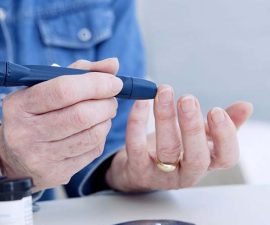Gestational diabetes is a type of diabetes that only occurs during pregnancy, as the name implies. It’s often diagnosed late in pregnancy, typically after 24th week pregnant. The good news, most pregnant women with the condition can successfully deliver healthy babies. If you’re diagnosed with gestational diabetes at 30 weeks pregnant, here are pieces of helpful information to remember.
What to expect at 30 weeks pregnant?
Third trimester starts from week 28 of pregnancy and lasts to giving birth (typically around 40th week of pregnancy). At 30 weeks pregnant, your baby continues to be more active and therefore you can feel lots of your baby movements each day.
You may be aware of many movements. There is no set number of these movements since it can vary from woman to woman, every pregnancy is unique. Just make sure you know the pattern of your baby movements! If this pattern changes, tell your doctor!
This week is also the time of when the receptors of your baby will be completely developed. The baby’s brain is also getting bigger.
Another significant change, the bone marrow of your baby usually has taken over production of red blood cells. This is very important step since it means the baby is better able to thrive on her /his own once born. And at 31 weeks pregnant, the baby will start to get signals from all five senses, more sensitive to what you eat, listen to the sound of your voice, perceive dark and light.
As the baby continuously grows and develops at 30th week of pregnancy, you may also experience some discomforts associated with these changes, these include:
- Feeling of breathless. This discomfort can occur due to you have extra pounds of weight to carry around and your bump put more pressure to your lungs.
- At 29-32 weeks of pregnancy, night leg cramps are also common symptom. This can cause difficulty sleeping since you may not get your comfortable at night. Lifestyle measures such as lying curled up on side with a cushion under bump and a bolster /pillow between legs may help.
- As baby get bigger in size, this puts more pressure on your urinary system too. As a result, you experience frequent urination or an urge to pass more urine.
- Other discomforts such as fatigue, heartburn, and backache.
What is gestational diabetes?
As mentioned earlier, it refers to diabetes that is only found and diagnosed during pregnancy. It is quite common condition – about 18 in every 100 pregnant women giving birth in Wales and England may be affected, according to NHS. And according to University of California San Francisco medical center, it affects about 7 % of all pregnancies. The bad news, it seems that the number of cases is growing.
Causes and symptoms
The answer of why some pregnant women develop gestational diabetes is not fully known. But the raised pregnancy hormones, especially in late pregnancy are often to blame.
In gestational diabetes, high levels of pregnancy hormones stimulated by placenta impair the action of insulin (hormone released by pancreas that is responsible for blood sugar control). As a result, blood sugar is easier to rise! And the placenta will make and release more insulin-blocking hormones as the baby grows.
There is usually no early symptom. Therefore, screening for gestational diabetes is usually a part of your prenatal care, especially true if you’re at high risk of developing the condition. If you do have the condition, you can experience discomfort symptoms of high blood sugar such as:
- Blurred vision.
- Recurrent infection such as a yeast infection.
- Increased thirst and dry mouth.
- Tiredness and frequent urination – but these symptoms are also quite common in late pregnancy even though if you don’t have gestational diabetes.
Prognosis and outlook
Although it is a temporary condition, it can increase your risk of type-2 diabetes (the most common form of diabetes mellitus). Therefore after pregnancy, it’s not bad idea to always stay with a healthy-balanced diet and do other appropriate lifestyle measures such as:
- Maintain your healthy weight!
- Breastfeeding is recommended after delivery, at least for 6 months. It’s the perfect way to completely nourish your newborn, and also very helpful to lose your pregnancy weight.
- Do exercise on 4-5 days a week! It’s undeniable that regular exercise can help improve your insulin sensitivity, lowering the risk of type-2 diabetes.
- Take screening for diabetes. This test is commonly recommended 3-6 weeks after giving birth to ensure that gestational diabetes has gone. Your doctor may also ask you to take a routine screening every 1-2 years.
Gestational diabetes at 30 weeks pregnant
It’s not uncommon to find gestational diabetes diagnosed at 30 weeks pregnant since again it usually occurs late in pregnancy. It’s commonly recommended to start taking screening test between weeks 24 to 28. But if you are at high risk of developing the condition, your doctor may ask you to take the screening earlier.
There are some treatments, but in fact gestational diabetes doesn’t go away during pregnancy. The best thing you can do is to control it as well over the course of your pregnancy.
And if you lose control on it, you’re at high risk of developing the following pregnancy complications:




